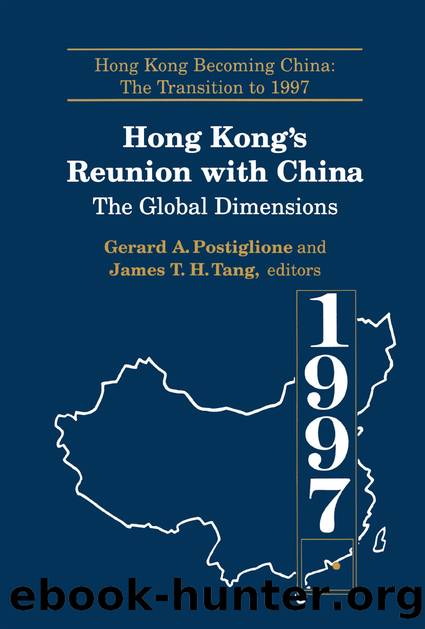Hong Kong's Reunion with China: The Global Dimensions (HONG KONG BECOMING CHINA) by Gerard A. Postiglione & James Tuck-Hong Tang

Author:Gerard A. Postiglione & James Tuck-Hong Tang [Postiglione, Gerard A. & Tang, James Tuck-Hong]
Language: eng
Format: epub
ISBN: 9781315503028
Publisher: Taylor and Francis
Published: 2016-07-01T05:00:00+00:00
Notes
1. See, for example, the following chapters in Ming K. Chan, ed., with John D. young, Precarious Balance: Hong Kong Between China and Britain, 1842–1992 (Armonk, NY: M.E. Sharpe, and Hong Kong: Hong Kong University Press, 1994): Ming K. Chan, “Hong Kong in Sino-British Conflict: Mass Mobilization and the Crisis of Legitimacy, 1912–26,” pp. 27–58; Tsai Jung-fang, “From Anti-foreignism to Popular Nationalism: Hong Kong Between China and Britain, 1839–1911,” pp. 9–26; and Norman Miners, “From Nationalistic Confrontation to Regional Collaboration: China-Hong Kong-Britain, 1926–1941,” pp. 59–70.
2. Joseph Fewsmith, Dilemmas of Reform in China: Political Conflict and Economic Debate (Armonk, NY: M.E. Sharpe, 1994), pp. 3–18, 19–55.
3. A Draft Agreement Between the Government of the United Kingdom and Britain and Northern Island and the Government of the People’s Republic of China on the Future of Hong Kong (Hong Kong: Government Printer, 1984) specifies the broad mechanisms. A set of annexes that deal with China’s policy toward Hong Kong, the nature of the Sino-British liaison group, and land leases, plus the exchange of memoranda between the British and Chinese governments, can be found in Frank Ching, Hong Kong and China: For Better or Worse (New York: China Council of the Asia Society and the Foreign Policy Association, 1985). The Basic Law was approved by the National People’s Congress in April 1990 in an atmosphere changed significantly by the events in China during the spring of 1989 and reaction to them in Hong Kong. A draft of the Basic Law with commentary appears in William McGum, Basic Law, Basic Questions (Hong Kong: Review Publishing Company, 1988). See also George Hicks, Hong Kong Countdown (Hong Kong: Writers and Publishers Cooperative, 1989) for views written before June 1989. The perception from Taipei is expressed in Jurgen Domes and Shaw Yu-ming, Hong Kong: A Chinese and International Concern (Boulder: Westview Press, 1989). A Canadian view is expressed in Jules Nadeau, Hong Kong 1997: Dans la Gueule du Dragon Rouge (Montreal: Editions Quebec/Amerique, 1990). See the comments in James T.H. Tang and Frank Ching, “The MacLehose-Youde Years: Balancing the Three-legged Stool, 1971–86” in M.K. Chan, ed., Precarious Balance, pp. 131–148; Frank Ching, “Toward Colonial Sunset: the Wilson Regime, 1987–92,” in Hong Kong and China, pp. 173–198; Michael DeGolyer, “Politics, Politicians and Political Parties,” in Donald H. McMillan and Man Si-wai, eds., The Other Hong Report: 1994 (Hong Kong: Chinese University Press, 1994), pp. 75–102; and K.K. Leung, “The Basic Law and the Problem of Political Transition,” in Stephen Y.S. Cheung and Stephen M.H. Sze, eds., The Other Hong Kong Report: 1995 (Hong Kong: Chinese University Press, 1995), pp. 33–50.
4. See my “Continuity and Transformation in the Pearl River Delta: Hong Kong’s Impact on its Hinterland,” in Reginald Y.W. Kwok and Alvin So, eds., The Hong Kong–Guangdong Link: Partnership in Flux (Armonk, NY: M.E. Sharpe, and Hong Kong: Hong Kong University Press, 1995), pp. 64–86.
5. For a popular account of the early period, see M. Collis, Foreign Mud (London: Faber and Faber, 1946). The most thorough scholarly analysis is
Download
This site does not store any files on its server. We only index and link to content provided by other sites. Please contact the content providers to delete copyright contents if any and email us, we'll remove relevant links or contents immediately.
International Integration of the Brazilian Economy by Elias C. Grivoyannis(57328)
The Radium Girls by Kate Moore(10908)
Turbulence by E. J. Noyes(7041)
Nudge - Improving Decisions about Health, Wealth, and Happiness by Thaler Sunstein(6634)
The Black Swan by Nassim Nicholas Taleb(6192)
Pioneering Portfolio Management by David F. Swensen(5606)
Rich Dad Poor Dad by Robert T. Kiyosaki(5150)
Zero to One by Peter Thiel(4824)
Man-made Catastrophes and Risk Information Concealment by Dmitry Chernov & Didier Sornette(4738)
Secrecy World by Jake Bernstein(3783)
Millionaire: The Philanderer, Gambler, and Duelist Who Invented Modern Finance by Janet Gleeson(3569)
Skin in the Game by Nassim Nicholas Taleb(3462)
The Age of Surveillance Capitalism by Shoshana Zuboff(3424)
The Money Culture by Michael Lewis(3284)
Skin in the Game: Hidden Asymmetries in Daily Life by Nassim Nicholas Taleb(3264)
Bullshit Jobs by David Graeber(3180)
The Dhandho Investor by Mohnish Pabrai(3169)
The Wisdom of Finance by Mihir Desai(3079)
Blockchain Basics by Daniel Drescher(2891)
